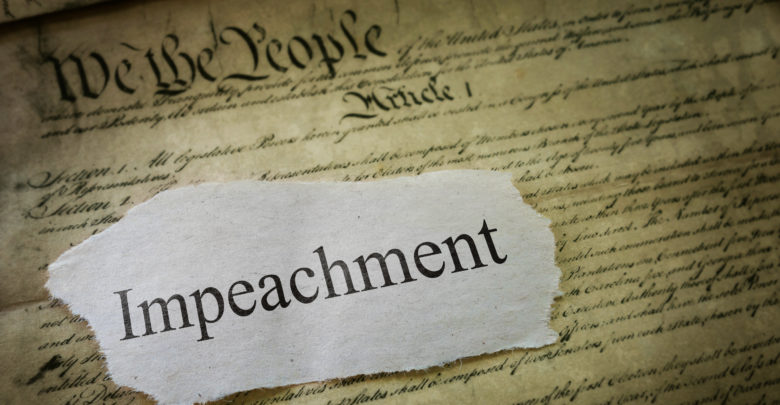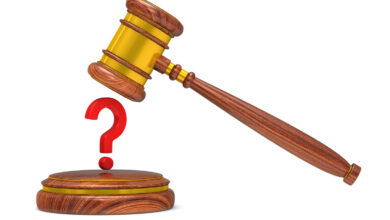
It’s time for the House Judiciary Committee to stop the hand-wringing and the political calculation, and formally announce the commencement of an impeachment investigation.
For all practical purposes, such an investigation is already under way. Congressional Democrats are seeking the factual record behind the Mueller report, and testimony from Mueller, Don McGahn and others on the laughably transparent pretext that they are pursuing some phantom legislative purpose that nobody in Congress can quite articulate, and nobody outside of Congress believes, or even understands.
By conducting a stealth impeachment inquiry thinly disguised as something else, congressional Democrats are feeding the Trump narrative of presidential harassment and making themselves look dishonest and impotent.
Worse, they are handing Trump and his coterie of enablers a legal argument, albeit a weak one, that Congress is straying beyond its constitutional borders by pursuing something that looks more like a law enforcement proceeding than a legislative process. Since the Constitution leaves law enforcement exclusively to the Executive branch, the argument goes, the courts should not permit Congress to usurp Executive authority. This may not be a winning argument, but it is more than enough to give Trump’s lawyers an admission ticket to endless court proceedings over the Constitution’s separation of powers.
Congressional Democrats can put an end to this legal charade, eliminating the major obstacle to obtaining the documents and testimony they need, with the stroke of a pen.
By declaring the commencement of a formal impeachment inquiry, the “no legislative purpose” argument disappears entirely, as does the claim that Congress is usurping authority that the Constitution grants exclusively to another branch of government. Article 1 of the Constitution is explicit: “The House of Representatives . . . shall have the sole Power of Impeachment.”
A formal impeachment inquiry would not only change the legal landscape, it would change the narrative, which has so far been dictated primarily by Attorney General William Barr.
By placing the focus on “principle [legal] conclusions” before anybody knew what was actually in the Mueller report, Barr framed the debate in terms of legal “prosecution and declination decisions.” Because Mueller had demurred from making a “traditional prosecutorial judgment” on whether Trump committed the crime of obstruction of justice, that question was left open to debate.
Barr stepped into the void and made his own decision that the facts laid out in the Mueller report were “not sufficient to establish that the President committed an obstruction-of-justice offense.” Others, including hundreds of former federal prosecutors who served in both Republican and Democratic administrations, reached the opposite conclusion. They stated that “the conduct of President Trump described in Special Counsel Robert Mueller’s report would, in the case of any other person not covered by the Office of Legal Counsel policy against indicting a sitting President, result in multiple felony charges for obstruction of justice.”
The problem is not that Barr’s argument is stronger than that of the former prosecutors. It isn’t. Or even that Barr’s viewpoint carries more weight because he is, after all, the Attorney General of the United States, whereas the former prosecutors are just people with opinions. Few people outside of Trump’s hard-core base view Barr as a neutral arbiter.
The problem is that whether or not the facts laid out in the Mueller report were sufficient to establish the crime of obstruction of justice is the wrong question.
By defining the debate in terms of criminal prosecutorial decisions before anybody had a chance to see the actual Mueller report, Barr successfully placed the public focus on the legal conclusions of the report, rather than its factual findings.
But impeachment would not rise or fall on a prosecutorial decision on obstruction of justice. Impeachment is a political process, not a law enforcement process. The constitutional impeachment standard of “high crimes and misdemeanors” has always “placed little emphasis on criminal conduct.” Instead, most articles of impeachment have alleged that a high government official “violated his duties or his oath or seriously undermined public confidence in his ability to perform his official functions.”
That means that Congress, in launching an impeachment inquiry, should be focused on the factual findings of the Mueller report, not on the debate over largely irrelevant prosecutorial decisions.
Suppose for a moment that the Mueller report made no attempt to make criminal prosecutorial decisions. Suppose it was simply a report on what Mueller’s team found after a comprehensive two-year investigation. Consider just a handful of those findings:
- “The Russian government interfered in the 2016 presidential election in sweeping and systematic fashion.”
- The Mueller investigation “identified numerous links between the Russian government and the Trump Campaign.” Those links included “Russian offers of assistance to the Campaign. In some instances, the Campaign was receptive to the offer, while in other instances the Campaign officials shied away.”
- The Trump Campaign “expected it would benefit electorally from information stolen and released through Russian efforts.”
- “The investigation established that several individuals affiliated with the Trump Campaign lied to the Office, and to Congress, about their interactions with Russian-affiliated individuals and related matters. Those lies materially impaired the investigation of Russian election interference.”
- Trump “denied having any business in or connections to Russia, even though as late as June 2016 the Trump Organization had been pursuing a licensing deal for a skyscraper to be built in Russia called Trump Tower Moscow.”
- “Beginning in 2017, the President of the United States took a variety of actions toward the ongoing FBI investigation into Russia’s interference in the 2016 presidential election and related matters that raised questions about whether he had obstructed justice.”
- “The evidence we obtained about the President’s actions and intent presents difficult issues that would need to be resolved if we were making a traditional prosecutorial judgment.”
- “[I]f we had confidence after a thorough investigation of the facts that the President clearly did not commit obstruction of justice, we would so state. Based on the facts and the applicable legal standards, we are unable to reach that judgment. Accordingly, while this report does not conclude that the President committed a crime, it also does not exonerate him.”
Given what may be the strongest factual predicate to begin a presidential impeachment inquiry in American history, all that stands in the way is political calculation.
There’s nothing inherently wrong with political calculation in what is, after all, a political process.
But there is a lot wrong with bad political calculation.
The idea that starting impeachment proceedings would play into Trump’s “presidential harassment” narrative, and risk alienating independents and moderates who want Congress to attend to the people’s business is, at best, a guess about which one of many possible political outcomes is most likely. It is equally possible that impeachment proceedings might finally get through to low-information voters in a way that a dense 400-page report can’t, especially when that report has previously reached them only as filtered through the lens of Fox News, or a haze of indifference.
There’s nothing like a lively reality TV show to capture people’s attention and form their impressions. How do you think the Mueller/McGahn/Cohen show would play?
It could be a big hit.
And consider the political consequences of not launching an impeachment inquiry. Handing Trump legal ammunition to use in stonewalling congressional inquiries would be the least of it. How about this as a Trump campaign ad:
“Conflicted Mueller and his 17 rabid Democrats found no criminal conduct. The Attorney General of the United States found no criminal conduct. And even congressional Democrats, who hate Trump with a passion and have done everything they can to bring him down, couldn’t find anything in the Mueller report that they could use to start an impeachment inquiry.”
And what about the political cover for the next corrupt president? If this record of misconduct isn’t enough, what is?
At the end of the day, the political fallout of deciding to start an impeachment inquiry, or not, is impossible to predict. As such, the decision should not be made on the basis of political calculation. Congressional Democrats should look at this as a blessing, not a curse.
Damn the political torpedoes. They might not even be aimed at you.
Just do your job. Do what’s right.
Start impeachment proceedings.





Bravo, Philip!
I am willing to give President Trump a pass on all his suspected, known and currently unknown offenses for one reason only: if he is impeached but not convicted, he is assured of being re-elected to a second term. We probably can undo all the damage he does to our country from one term. A second term for this President will be cataclysmic. Our nation will tear itself apart.
Many presidents have committed “impeachable” offenses. This seems to go with modern US presidencies. We survive just fine in spite of these. Mr. Trump is a different kind of offender though, more dangerous than President Nixon ever could have been.
Why not slip into the likely more productive path of trying to identify and support a sensible opposition candidate who could make a second Trump term impossible? Put all this Trump hatred–and this all seems to me to be transparent hatred (regardless of its justification)–into an effort far more likely to succeed than impeachment conviction.
And even if an impeachment effort resulted in conviction, do you really want a Pence presidency? I do not think you have any idea of how much animosity exists throughout our country within the heretofore silent yet seething majority. President Trump’s election was NOT a fluke. President Trump tragically represents exactly the presidency that his supporters wanted and received. Give these people another presidential victory and you all will wish for the comparative serenity of the President’s first term.
Impeachment appears to you as a good place to start, but it will never result in a good way to finish.
Hey Bradley. I’d agree with your analysis if I agreed with your premise that if Trump is impeached but not convicted he will be re-elected. I just don’t believe that. I believe it’s more likely that if no impeachment proceedings are started, Trump will be greatly strengthened by what many will perceive as confirmation of his claim that the whole thing was a witch hunt from start to finish. And although the title of my article is simply “Impeach,” what I am really in favor of is starting an impeachment inquiry, not necessarily impeaching. I’d be glad to see that TV show continue right up to the election, with or without a vote. Anyway, there are so many other variables surrounding Trump’s re-election that we may never know which of us has it right.